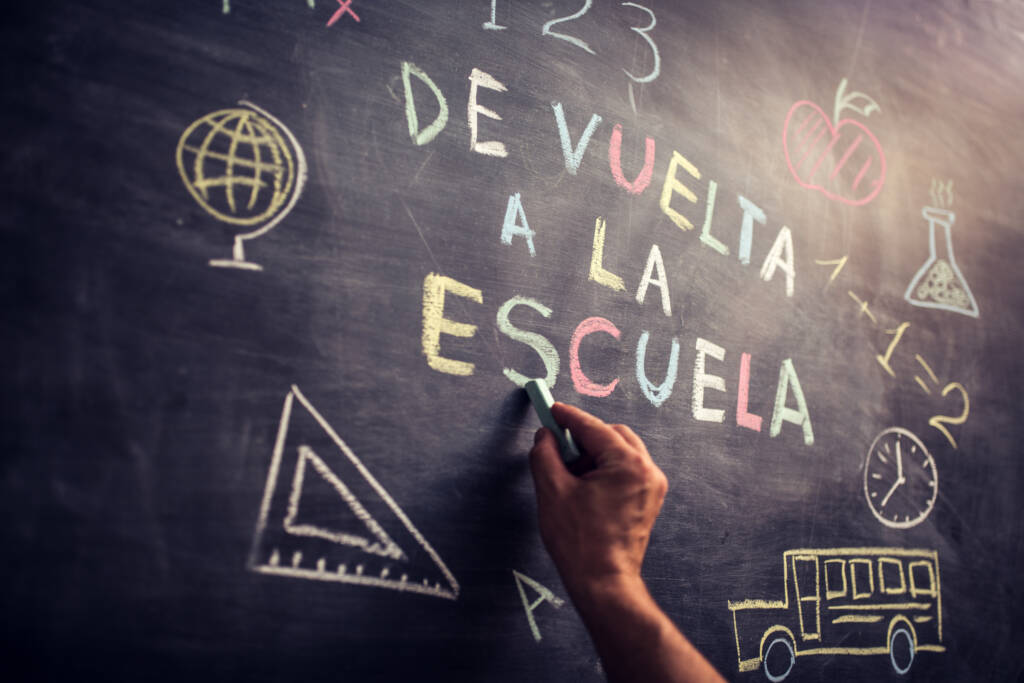
Adult Education Spanish 1

Learn basic Spanish grammar to help build your fluency and understanding, and apply what you learn through interactive games, written practice, listening, and speaking exercises. This course provides elective credit.
Cost: Students purchase 28 days of access for $105. Students may work as quickly through the content as they wish. Every 28 days, students may purchase an additional 28 days of access for an additional $105.
Major Topics and Concepts
Segment 1
Module 1:
-
- My life and me
- Greetings
- Basic geography
- Importance of speaking Spanish
- Where is Spanish spoken?
- Introductions
- Tú vs. Usted
- Alphabet
- Numbers 0–30
- Age
- Written presentation about self
- Days of the week
- Months
- Personality traits
- Who am I in a global world?
- Cognates
- Ser: yo
- Tener: tengo, tienes
- Question words: ¿Cómo?, ¿Cuántos? ¿Cuándo?
- Oral presentation describing self
- Reading and listening comprehension
Module 2:
-
- Describing likes and dislikes with gustar
- School schedules
- School systems in Spanish-speaking countries
- Describing classes and teachers
- Stating opinions
- Asking questions
- Identifying and locating classroom items
- Telling time
- 24-hour clock
- Ordinal numbers
- Written presentation of a blog
- Numbers 31–60
- Ir: voy, vas, va
- Subject pronouns: él, ella, usted
- Definite and indefinite articles
- Noun-adjective agreement
- Reading and listening comprehension
- Oral presentation describing likes and dislikes
Module 3:
-
- My preferences and me
- Food and beverages
- Describing a meal
- Describing how often you eat a meal
- How to order and pay in a restaurant
- Mealtime practices in Spanish-speaking countries
- Regular -ar, -er, and -ir verbs
- Tener expressions
- Written presentation of a survey
- Prefiero, quiero, almuerzo
- Numbers 0–1000
- Describing rooms of a house
- Household chores
- Shopping
- Preparing for a party
- Metric system
- Money
- Reading and listening comprehension
- Oral presentation describing preferences
Module 4:
-
- My house and me
- Houses in Spanish-speaking countries
- Characteristics of a home
- Tener: tengo, tienes,
- Estar: estoy, estás, está
- Estar with feelings
- Ser: soy, eres, es
- Ir a vs. Ir al
- Written presentation about the house
- Household furniture vocabulary
- Chores vocabulary
- Numbers 0–1,000,000
- Irregular yo verbs; pongo, salgo, hago, tengo
- Creating a budget
- Reading and listening comprehension
- Oral presentation describing chores and how to prepare home for party
Segment 2
Module 5:
-
- My family and me
- Immediate and extended families
- Occupations
- Family traditions in Spanish-speaking countries
- Plural subject pronouns
- Tener and ser irregular forms
- Possessive adjectives
- Written presentation about family
- Contraction del
- Prepositions
- Nationalities
- Oral presentation describing family member
- Reading and listening comprehension
Module 6:
-
- My free time and me
- Jugar
- Issuing and accepting an invitation
- Dating customs in Spanish-speaking countries
- Music from Spanish-speaking countries
- Sports from Spanish-speaking countries
- Sports and pastimes
- Written presentation of a narration of my life
- Weather expressions
- Types of clothing
- Conmigo, contigo
- eàie, eài stem-changing of the verbs entender, cerrar, servir, pedir
- Reviewing time expressions
- Reviewing tener expressions
- Celsius vs. Fahrenheit
- Oral presentation about activities done in different seasons
- Reading and listening comprehension
Module 7:
-
- My city and me
- Forms of transportation
- City vs. country
- Weather review
- Review of prepositions
- Review of estar and hay
- Review porque vs. por que
- Review estar with feelings and location
- Prepositions al and del
- Written presentation about traveling and an itinerary
- Transportation in Spanish-speaking countries
- City vs. country life in Spanish-speaking countries
- Introduction of saber vs. conocer
- Describing near future with ir + a + infinitive
- Oral presentation about traveling
- Reading and listening comprehension
Competencies
AR, ER and IR Verb Conjugation, and Numbers
Students will demonstrate an understanding of AR, ER and IR verb conjugations and numbers by interpreting and communicating in written and spoken Spanish on topics such as shopping, food and meal customs in the Spanish-speaking world.
Definite and Indefinite Articles, Time, Dates, and Verb Conjugation
Students will demonstrate an understanding of definite and indefinite articles, time, dates and verb conjugation by interpreting and communicating in written and spoken Spanish on topics such as schools and schedules.
Introductions, Pronunciation, Cognates and Adjectives
Students will demonstrate an understanding of greetings and introductions, pronunciation, cognates, and adjectives by interpreting and communicating in written and spoken Spanish on topics such as information about oneself.
Irregular Verbs HAY, SER, TENER, IR, and ESTAR and Irregular Yo Go Verbs
Students will demonstrate an understanding of irregular verbs HAY, SER, TENER, IR, and ESTAR and irregular yo go verbs by interpreting and communicating in written and spoken Spanish on topics such as the home and household chores.
GUSTAR, Plural Verb Conjugations, and Possessive and Descriptive Adjectives
Students will demonstrate an understanding of GUSTAR, plural verb conjugations, and possessive and descriptive adjectives by interpreting and communicating in written and spoken Spanish on topics such as family, nationalities, and occupations.
SER vs. ESTAR, SABER vs. CONOCER, and Future with IR
Students will demonstrate an understanding of SER vs. ESTAR, SABER vs. CONOCER, future with IR by interpreting and communicating in written and spoken Spanish on topics such as descriptions and attractions of cities and the countryside.
Stem-Changing Verbs, Weather, Adverbs of Frequency
Students will demonstrate an understanding of stem-changing verbs, weather, and adverbs of frequency by interpreting and communicating in written and spoken Spanish on topics such as seasons, pastimes and activities.

